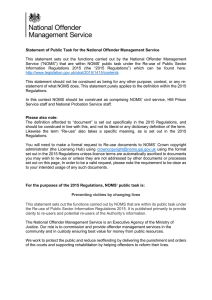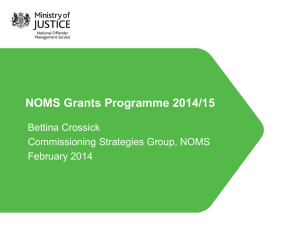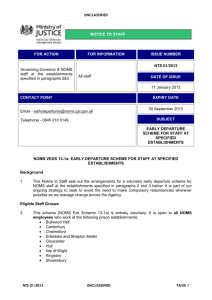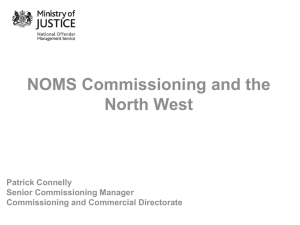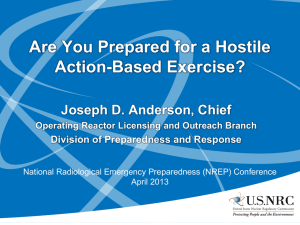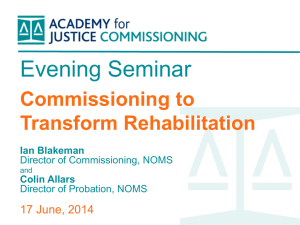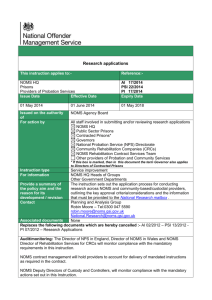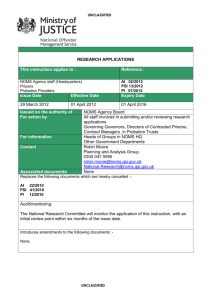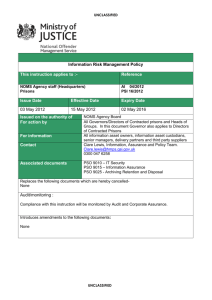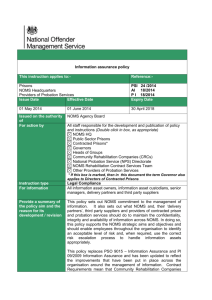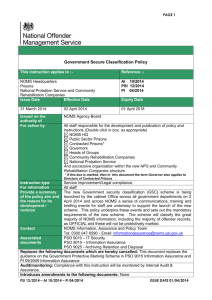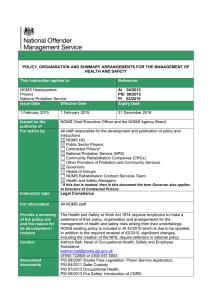Access Oxford 2014MB
advertisement
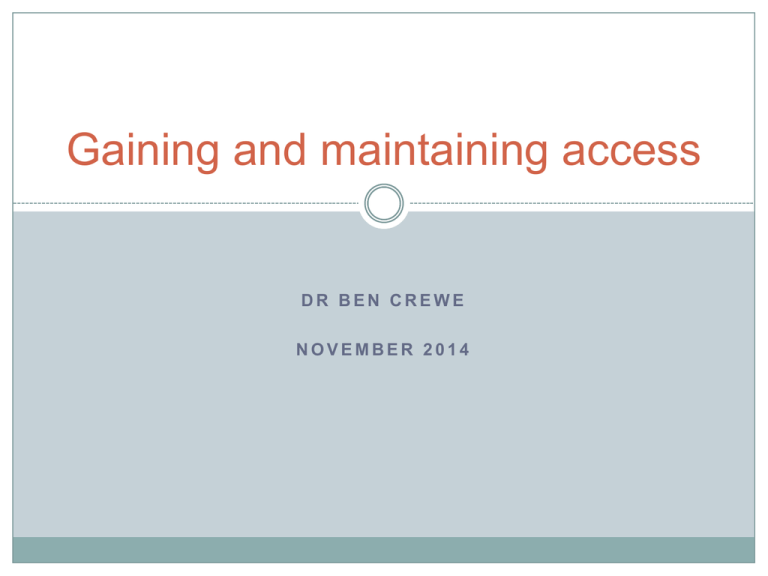
Gaining and maintaining access DR BEN CREWE NOVEMBER 2014 Doing research in prisons/NOMS: The National Research Committee It is the responsibility of the National Research Committee to: • • • Quality assure and approve/ reject internal and external research projects Identify gaps in the current/planned research programme to inform future research prioritisation. Improve the quality and utility of research produced across NOMS. “Research is encouraged whenever it has the potential to increase the effectiveness of operational policy/delivery (either in the short or longer term), maximising the use of NOMS limited resources. As a consequence of the sheer volume of requests, NOMS must be selective when considering proposals.” The scope of the NRC The NRC processes apply to research that has been commissioned and funded both internally and externally. It applies to research across the prison service and probation providers. This includes research in Young Offenders’ Institutions (YOIs), but excludes research in Secure Training Centres, Secure Children’s Homes or with Youth Offending Teams (YJB contact: research@yjb.gov.uk). The processes apply to all studies and evaluations which apply recognisable research methods to generate quantitative and/or qualitative information in order to address specific research questions. From January to October 2012, 104 research applications were considered by the full NRC. Of these, 58 (56%) have so far been approved and 29 (28%) declined. i.e. have a back-up plan. Contact details: Robin.Moore@noms.gsi.gov.uk/National.Research@noms.gsi.gov.uk http://www.justice.gov.uk/publications/research-and-analysis/noms The NRC process: how does it work? Research proposal submitted to NOMS Research Mailbox Research commissioned by NOMS HQ or research relating to extremism or research across more than one establishment/trust: Application considered by NRC Non-HQ commissioned research and non-extremism research in one establishment/trust: Application considered by individual establishment/trust, with NRC notified of decision The decision to grant access to prison establishments or probation trusts ultimately lies with the Governing Governor or Contract Manager of the establishment/trust concerned. The decision to grant access to existing data lies with the Information Asset Owners for each data source. http://www.justice.gov.uk/downloads/publications/corporatereports/noms/2012/noms-business-plan-2012-2013.pdf Business priorities Skills / competencies Ethics NRC approval Data protection / security Resource demands Research overlaps Robustness NRC application questions Aims and objectives Aim of the research - use bullet-points - keep it clear and simple Primary research questions – no more than three or four questions Potential benefits to NOMS – draw directly on NOMS strategic priorities Potential benefits to academic knowledge – i.e. brief literature review Previous research in this area – fine to use references Main limitations – be honest; show awareness, don’t over-claim Proposed methodology: Proposed design and methodology (incl sampling/sample sizes) Methods of analysis – be specific i.e. which statistical tests/coding methods Resource implications (demands on staff time, office space, etc) – be realistic; don’t ask for keys [initially] Main methodological and/or operational risks and how these will be mitigated NRC application questions contd Access to establishments/trusts Details on what access is required, with opportunity to nominate – include detail of why Equipment you wish to use – e.g. digital voice recorder; laptop Data Protection Use, storage, retention and disposal of personal data, including ‘anonymity’ take this very seriously – secure storage and transportation etc Research Ethics Ethical considerations/ strategies; consideration by other ethics committees – NB will need information sheet and consent form; information sheet should be detailed [see next slide] Be clear about the limits to confidentiality: Serious harm to self or others Risk to the prison’s security Disclosure of an unknown offence Contents of information sheet Who you are (university, stage of study etc) The aims and methods of the study Who is funding/ sponsoring the research Duration of research participation Explanation of terms of confidentiality and anonymity Explanation of likely uses of the data (thesis, publication?) Explanation of any potential risks and benefits Right to withdraw own data at end of session (or up to a particular point) Request for participation, noting that research is voluntary and the right to withdraw at any point Information on how to contact the senior researcher Indication of whether participants will be given copy of the research etc Key tips – seeking access Be aware of the concerns of your gatekeepers (a) Governors (b) Forensic psychologists (c) The service as a whole (a) Key concerns: resources, data protection, ethics, relevance Try to identify sympathetic governors Take advantage of networks, reputation, and previous experience Try to demonstrate that you are trustworthy and have integrity Read the rubric: NOMS PSO 7035 Be politically smart Key tips – after initial rejection NB you have only one shot at resubmission Make use of the NRC itself / speak in person Try not to be defensive Key tips – maintaining access/ once you’re in Print out your letter of clearance Be flexible Be assertively pragmatic Once you’re in, you’re in… There is no direct or necessary relationship between ethics committee approval of a research project and what actually happens when the research is undertaken. The committee does not have direct control over what the researcher actually does. Ultimately, responsibility falls back to the researchers themselves – they are the ones on whom the conduct of ethical research depends (Guillemim and Gillan, 2004: 269)
